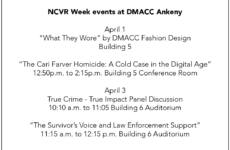Desiree Martinez is a 35- year- old Ankeny DMACC student who is currently minoring in photography with a major of fashion and design. Martinez isn’t like most students; she is also married with six boys of her own to raise with her husband of six years.
This is the life of quite a few students at DMACC: the double life of going to school while also juggling home life and in many cases a full time job as well.
For Martinez, she’s getting up on a typical day at 5 a.m. or 5:30 a.m. at the latest, and then getting her husband off to work, making lunches, getting the kids off to school, going to school herself, and then getting home, getting her kids ready to go off to sports, and [then] they get home, homework and then ready for bed.
“I find myself doing homework pretty late and I’m staying up pretty late,” Martinez said.
Martinez said that the hardest part of her life is trying to find a balance, as her children are between the ages of 21 and 6.
“Juggling school, work, sports, meal planning; its all a big task,” Martinez said.
Her kids also participate in numerous sports such as football, baseball and wrestling, so for Martinez it is always a challenge for her.
“Having a structured schedule is the most difficult, especially during sports season because we are not getting in bed until later, or we’re not able to sit down and eat a meal. We’re having to eat on the go or be in the car all the time during sports season.”
For many parents that are going to school, there is also the issue of trying to balance a schedule around their kids.
For another student, Heather Richmond, a liberal arts major, with two boys ages 10 and 11, life is similar.
She has to balance her school schedule around her kids’ schedules on a daily basis.
“Obviously working, going to school, all of their activities, all of their appointments, anything doctor, literally it’s all on me; there isn’t anybody that is taking up half that slack,” Richmond said.
“[It’s] time consuming, its very different; you have to be able to manage your time. My schedule is completely and totally planned out sometimes down to the minute of days, to get the homework done, to get everything else done, to make sure the work is done, make sure their homework is done; everything is planned out,” Richmond said.
A typical day for her however depends on whether or not she has classes.
“If I have classes, I work overnight, on the nights I work overnight I get home and get them up and off to school, on the days I don’t I get them up in the morning and then get them off to school the days I have classes, its spending the whole day in class. On the days I don’t it depends on whether or not they have appointments or other things going on,” Richmond said.
Yet the matter still stands that adults with kids are going back to school, whether it be to improve their lives or their careers.
According to Delores Hawkins of the Financial Aid office, in the 2013-2014 school year her department has awarded aid money to 1,589 Ankeny campus students who said ‘Yes’ to having children they support on the Free Application For Student Aid (FAFSA) who enrolled in classes in fall or spring terms.
According to a study done by the National Center for Education Statistics, or NCES, there is a predicted 13% rise in enrollments for students under the age of 25, and a 14% rise in enrollment for students aged 25 and over in the years 2011 to 2021.
In another study done by Georgetown University’s Center on Education and Workforce, a college graduate earns 84 percent more money over their lifetimes on average than people with just high school diplomas.
For students and many staff on the Ankeny campus, there is the child development program which provides child care.
According to Sherri Sciarrotta of the child development program, the center is open for children ages 2-5 and serves families on student contact days. The center is closed when students are not on campus. They are open 7 a.m. -5 p.m. fall and spring semesters and 7:30 a.m.-4:30 p.m. during the summer semester. Also their program strives to provide affordable, quality care for all DMACC families.
The program serves 41 students and it costs $165.00 a week or $34.50 a day or $22.00 a half day.
For students at the Boone and Carroll campuses who are single parents, there is a program called Iowa One Life. This program caters to roughly 100 students on both campuses, although Boone obviously has more students on the program. The program was started in 1987 during the Farm Crisis for displaced farmwives that were going through the crisis.
Now the program aims to help single parents. For this program, it is only offered at the Boone and Carroll campuses.
For these parents, no matter how much they have to watch their time and watch how they schedule things, at least they are working to make their lives better.
“It’s a commitment and you have to really know how to manage your time,” Richmond said.






Comments